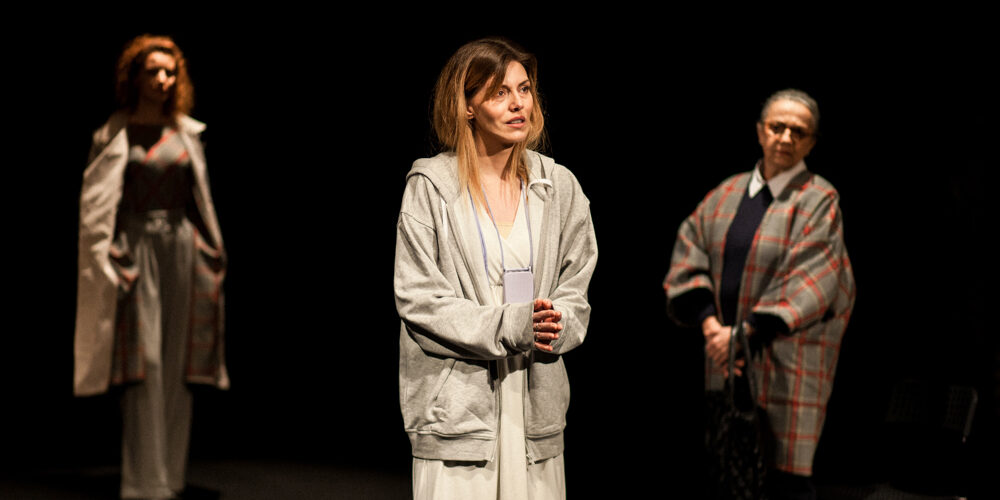Atelje 212, Belgrade, premiere 16th December 2023
Atelje 212 continues its well-deserved reputation of staging plays that speak to women with its new show Mum, written by an English playwright Morgan Lloyd Malcom, and directed by Nebojša Bradić.
Mum deals with the topics of postnatal depression and the struggles of early motherhood, the feelings of inadequacy that new mothers feel as well as the suppressed anger of women who are under a lot of societal pressure and who are chronically tired.
Bradić previously directed Consent, by another English playwright, Nina Raine, a play about issues of rape and consent. He is clearly a director who is interested in feminist topics. His directorial style is reminiscent of Consent, and both have the atmosphere of an Ibsen play, where the middle class in their salons talk about the problems of women which are still considered taboo. Just like Nora in The Dollhouse, the protagonist of Mum, Nina, played by Tamara Dragičević, shares a secret with her friend, Jackie (Jelena Stupljanin), which turns her life upside down once it comes out.
Nina tells Jackie that she is suffering from fatigue, that she is so tired that her only wish is a night of uninterrupted sleep, and that she sometimes even feels a desire to hurt the child, even though she would never really do it. Later, when doctors discover bruises on the baby’s body, Jackie will tell the police about Nina’s confession and trust of female friendship will be sacrificed for the good of the child, which Nina considers a betrayal.
The hell that Nina goes through when her baby is taken away is even bigger because of the presence of Pearl, her mother-in-law (Jasmina Avramović). Pearl shows signs of Jocasta’s syndrome in the way she intervenes in the marriage of her son and Nina, and in Nina’s words, Pearl’s son never really grew up, since his mother always treated him like a child, and he became a man prone to watching underage pornography.
The animosity between Nina and Pearl is the main source of conflict in this play. But, unexpectedly, it also becomes a play about Nina’s relationship with her mother, and the greatest strength of this play lies in its portrayal of this relationship. Malcolm takes us back in time, before Nina gave birth to a baby, when her mother (also played by Jasmina Avramović) was still alive and ill, slowly dying of cancer. We learn that Nina’s struggle with motherhood is a generational trauma that she inherited from her mother, who also struggled with postnatal depression. There’s a complex bond between them, consisting of care, love, anger, guilt, manipulation, neediness, and recognition. Both Jasmina Avramović and Tamara Dragičević give strong, emotional performances in these dark scenes. Literally dark. There is no scenography, only a little stage light directed at them. Their tears seem real, their voices crack, and the lines that are hardest to hear are also the quietest, for example when Mother tells Nina to abort her child, on hearing that she’s pregnant, she simply says: “Get rid of it.“

Mum – Atelje212
Jackie’s character doesn’t get as much space and Jelena Stupljanin has less to do as the concerned friend. She also plays the police investigator, which is a minor role and not especially interesting in the staging of this show; it feels as if somebody had to say those lines so they were given to the other two performers.
However, the relationship between the two friends is really interesting, with Nina envying Jackie’s freedom because she doesn’t have a child, and Jackie genuinely trying to help Nina, which puts Nina in a defensive state. Jackie’s character will be the one who will help Nina to realize that her depression is suppressed anger because no one believes her that she didn’t hurt her baby, and because nobody asked her how she felt after she gave birth.
Tamara Dragičević shows a different side of her acting in this show. The audience will be familiar with her performance as various charming characters, like Silvana Armenulić in the film Toma, Dorothy in Slavna Florens and Kitty in Consent (both at Atelje 212). In Mum, Dragičević explores suppressed female rage after a long period of self-destructive people-pleasing and burning out.
In the end, it turns out that this whole series of events was just a nightmare that Nina experienced in the early days of her motherhood. However, even though it was all just a dream, the catastrophic scenario shows the fear, anger, and all the suppressed feelings that a lot of mothers go through after giving birth, the things we just don’t talk about it, because it’s still a taboo to not be a perfect mother, to be someone who needs help from her family and society. This is the main reason why this show is so cathartic and important. It educates the audience on this subject and leaves them, hopefully, a little bit healed.
On this level its an important piece, but it does feel like they missed some opportunities on a directorial level. Even though the poster promises punk and surrealism, the dominant mode is one of downbeat realism, even though the whole concept of the play is a dream sequence. The scenography is minimal, just two chairs, and the acting style naturalistic. The costumes are very simple everyday middle-class outfits, with some the same plaid cloth connecting the costumes of Jackie and Pearl (costumes by Marija Jevtić).
The production relies on the importance of the topic for its impact, from a stylistic point of view it is quite flat and restrained as if just talking about the topic is enough. Although, it is necessary to speak about taboo subjects like postnatal depression, mental health, and woman’s role in both the family and society, struggles that were hidden for centuries, and it is good for female actors to get to work on complex characters, it’s not enough. We need to talk more about these things, we should normalise these stories so we can play them with more freedom and more experimentation.
Credits:
Written by Morgan Lloyd Malcolm//Translation: Đorđe Krivokapić// Director: Nebojša Bradić//Dramaturgy: Lora Džolić//Scenography: Marija Jevtić// Costume: Marina Medenica//Composer: Aleksandra Vrebalov
Cast: Tamara Dragičević, Jelena Stupljanin, Jasmina Avramović
For tickets and further information, visit: Atelje212.rs
Mina Milošević is a playwright, dramaturg, screenwriter, and theoretician based in Belgrade. She holds a BA in Dramaturgy and an MA in Theory of Drama Arts at the Faculty of Dramatic Arts in Belgrade. She worked as a dramaturg on plays in Atelje 212, Belgrade Drama Theatre, Yugoslav Drama Theatre, National Theatre in Belgrade, and Oda Theatre in Prishtina. Her play "Dr Ausländer (Made for Germany)" was presented at BITEF festival 2022. Her master's thesis on female friendship in Serbian contemporary theatre won the "Professor Boško Milin" Award.








